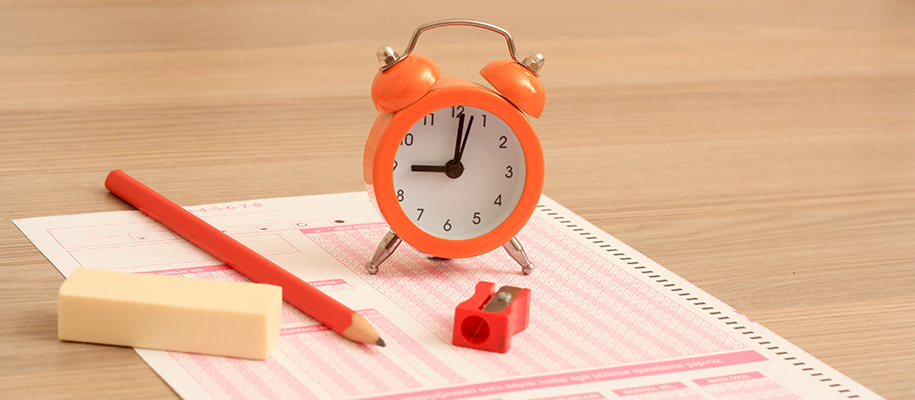The SAT is one of the biggest tests of a student's life. You may think you're doing everything possible to earn a top score—but you may be wrong. There are many everyday habits that could be hurting rather than helping in your SAT preparation.
From the way you study to what you eat, there are many ways to fine-tune your SAT prep strategies. Here are a few things that may be preventing you from achieving your best SAT scores possible, plus what you should do instead.
1. Studying only while sedentary
Students who spend hours at a desk studying are depriving their brains of much-needed stimulation through physical activity. Many studies show a positive association between physical activity and academic performance.
While researchers haven't determined the reason this happens, many experts point to an increased flow of blood and oxygen to the brain as well as higher levels of chemicals that help improve mood. Instead of dedicating all your time to studying in a chair, take breaks to get out and go for a walk, play your favorite sport, or find another way to infuse physical activity into your routine.
2. Hiding your phone while studying
Though it may seem counterintuitive, if putting away your phone is part of your study plan, you could be missing out. Students can access so many options for SAT prep through their phones today. SAT study apps can break up monotonous routines. Additionally, many websites and tutoring companies like Kaplan offer a free SAT Question of the Day on their websites. By using your phone, you'll be able to tackle SAT prep even on the go!
Related: 5 of the Best Apps to Help You Study for Standardized Tests
3. Concentrating on the clock
One of the biggest barriers to achieving high SAT scores is the lack of time during the exam. Many students would do much better if they weren't stressed and worried that they may not finish all the questions in time.
One strategy to overcome this problem is to put away the clock during your SAT practice exams. Start by practicing some untimed SAT sections to focus on accuracy and pinpoint where you're spending the most time. Once you've identified these areas, transition to timed practice to build your pacing skills. Learn time-saving techniques like skipping tough questions and returning to them later or using the process of elimination. The more you practice under realistic conditions, the faster and more confident you'll become on test day.
4. Seeing the road instead of the destination
It’s easy to get caught up thinking about the actual test during SAT prep. But by concentrating on the actual exam—what it’s going to be like, how to manage your time, and so on—you can forget about the end result: your scores. In any goal setting, it’s helpful to picture the end result. This kind of visualization might seem wishy-washy, but this strategy can help.
Envision yourself achieving the scores you want. To aid these efforts, you should write your ideal SAT score on a piece of paper then pick a place you see often, like a bathroom mirror or the family fridge, and post your goal there. This physical reminder will help you see your goal daily, motivating you to achieve it.
Related: How to Set Reasonable Expectations for Your SAT or ACT Scores
5. Not maximizing downtime
Students are busier than ever with athletics, arts, social activities, and not to mention regular schoolwork all competing for time in your schedule. But there are small available windows in your day that you may forget to use—before class, between activities, or right before dinner, for example. These pockets are a great time to learn SAT vocabulary.
By committing to learning one or two words during breaks throughout the day, you'll easily be able to memorize over 10 new terms. This will help you recognize and understand complex words in context for the SAT Evidence-Based Reading and Writing section. It will also help broaden your vocabulary for college and scholarship essays.
6. Eating an unbalanced diet
What you eat may seem like it has nothing to do with SAT prep, but that old adage of “You are what you eat” does have merit. Binging on fast food can affect your energy levels, which can have adverse consequences on your study habits. Try eating more whole fruits, vegetables, and grains during SAT prep (and throughout life, of course).
Foods rich in phytoestrogens, like soybeans and soy-based products, can also be beneficial. Soybeans have phytoestrogens, such as isoflavones, that have been linked to improved function of the frontal lobe, which is responsible for short-term memory, attention, and motivation. Students who eat healthily can see improved results in their academic performance as well as their overall well-being.
Related: The Best Advice for Healthy Eating in High School
When trying to achieve your highest scores possible on the SAT, every little bit of prep helps. Being aware of some of the things that may be hurting your SAT prep and what you can do about it may be just what you need to succeed.
While you're adjusting your SAT prep approach, check out Our Best Advice for Homework, Studying, and Tests for even more great tools and tips!








